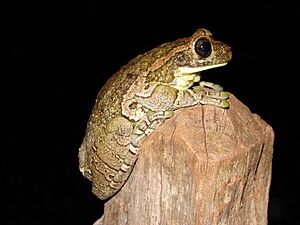Veined tree frog facts for kids
Quick facts for kids Veined tree frog |
|
|---|---|
 |
|
| Conservation status | |
| Scientific classification |
|
| Kingdom: | Animalia |
| Phylum: | Chordata |
| Class: | Amphibia |
| Order: | Anura |
| Family: | Hylidae |
| Genus: | Trachycephalus |
| Species: |
T. typhonius
|
| Binomial name | |
| Trachycephalus typhonius (Laurenti, 1768)
|
|
| Script error: The function "autoWithCaption" does not exist. | |
| Synonyms | |
|
|
Script error: No such module "Check for conflicting parameters".
The veined tree frog (Trachycephalus typhonius), also known as the common milk frog, is a type of frog. It belongs to the Hylidae family, which includes many tree frogs. This frog used to be called Phrynohyas, but scientists recently changed its name to Trachycephalus.
Contents
About the Veined Tree Frog
The veined tree frog is a fascinating creature. It is known for its unique skin and its ability to live in many different places. These frogs are mostly active at night. During the day, they like to hide in tree branches. They also prefer areas with lots of plants.
Where the Veined Tree Frog Lives
You can find the veined tree frog in Central and South America. It lives in many kinds of natural habitats. These include dry and wet forests, as well as moist shrublands. It also likes dry lowland grasslands.
Water and Land Homes
This frog can be found near rivers and freshwater lakes. It also lives in freshwater marshes. Sometimes, these rivers and marshes dry up for a while. The veined tree frog can still survive there.
Living Near People
Interestingly, this frog can also live close to humans. You might find it in arable land (farms) or pastureland. It also lives in plantations and rural gardens. Even in urban areas, these frogs can be found. They use water storage areas and ponds for their homes. They can even live in forests that have been changed by people.
Special Skin of the Veined Tree Frog
The veined tree frog is one of several tree frogs that have a special defense. Their skin can release a substance. This substance is not super dangerous, but it can cause irritation. If it touches sensitive areas like your eyes or mouth, it might feel uncomfortable. It can cause a burning feeling or pain. This is how the frog protects itself from predators.
What Eats the Veined Tree Frog?
Even with its special skin, the veined tree frog can become food for other animals. For example, a mantis has been seen eating this frog. This shows that even animals with defenses can be part of the food chain.
 | Jackie Robinson |
 | Jack Johnson |
 | Althea Gibson |
 | Arthur Ashe |
 | Muhammad Ali |


